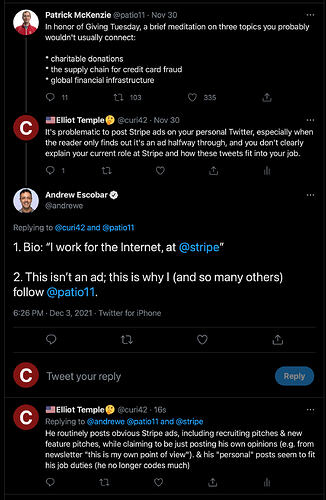The Reisman argument is from his criticism of opportunity cost in “Capitalism” by George Reisman, Chapter 11, Part A, Section 6:
The doctrine of opportunity cost is not required for ascertaining how one might do better. Its sole contribution is obfuscation, not perception. Consider its implications.
Our store owner, if we are to believe such authors as Samuelson and Nordhaus, has lost $10,000. Nevertheless, he has gone through the year consuming $40,000 and adding $10,000 to his net worth. He has bought a car and taken a vacation, and, at the same time, added $10,000 to his bank account. If he in fact had had a loss of $10,000, this would not have been possible. Consuming $40,000, while losing $10,000, would have meant a decline in his net worth of $50,000. How can this discrepancy of $60,000 between the facts and the implications of the opportunity-cost doctrine be reconciled? How can the $10,000 increase in the store owner’s net worth, which in fact occurs, be reconciled with the $50,000 decrease in his net worth which the opportunity-cost doctrine implies?
The solution to this puzzle is a second step into unreality, a second fiction to balance the first. It is that in addition to incurring the loss he never incurred, the store owner is alleged to receive income he never received! For not only does he have a $10,000 loss, it is claimed, but he also earns $15,000 in interest and $45,000 in wages. His $50,000-profit income is, it is claimed, in reality[!] a $10,000 loss accompanied by $60,000 in interest and wage income! And thus, paradoxically, the very interest and wage incomes which were not earned, and the failure of which to earn supposedly gave rise to the need for counting them as costs, are treated as being earned! They are held to be simultaneously not earned and earned.
What is involved in this juggling must be spelled out more fully. The store owner forgoes $60,000 in interest and wage income by virtue of remaining in his present business. This $60,000 which he does not make is treated as an outlay of his business, despite the fact that no such outlay exists. This nonexistent outlay then causes a nonexistent loss. The nonexistent loss, however, contradicts the change in the store owner’s net worth. To reconcile this contradiction, the store owner is then credited with a nonexistent interest and wage income equal to his nonexistent payment of interest and wages. He allegedly now earns the interest and wage income he doesn’t earn and which, in not being earned, created the whole alleged problem in the first place. He supposedly pays the interest and wages he doesn’t pay, to himself, so he now receives from himself the interest and wages he doesn’t receive.
An analogy to this procedure would be the following. One gains ten pounds, but might have gained twenty pounds. This is then taken to mean that one has lost ten pounds. When one’s alleged loss of weight cannot be reconciled with the fact that one is now ten pounds too large for one’s clothes, one’s oversize is explained on the grounds that one’s clothes have shrunk the equivalent of twenty pounds. Or: one marries a pretty woman, but might have married a very beautiful woman. This is then taken to mean that one has married an ugly woman. When the woman’s alleged ugliness cannot be reconciled with the fact that she is pretty, her prettiness is then explained on the grounds that she has had plastic surgery.

